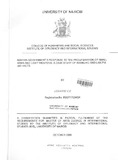| dc.contributor.author | Leshore, GE | |
| dc.date.accessioned | 2013-05-07T12:03:52Z | |
| dc.date.available | 2013-05-07T12:03:52Z | |
| dc.date.issued | 2006 | |
| dc.identifier.citation | A dissertation submitted in partial fulfilment of the requirements for master of arts degree in international studies to the institute of diplomacy and international studies (idis), University of Nairobi | en |
| dc.identifier.uri | http://erepository.uonbi.ac.ke:8080/xmlui/handle/123456789/19828 | |
| dc.description.abstract | This study investigated the response of the Kenyan government to the proliferation of small arms in Samburu and Laikipia Districts in the Northern part of Kenya. The study focused on the factors fueling small arms proliferation and the government's response through disarmament and recruitment of Kenya Police Reserves (KPR) as a means of filling the security gap.
The main argument in this thesis is that the government has not provided adequate security to the people living in Laikipia and Samburu districts. The result has been resort by the local community to arming as a means of protection and self-defense. The study reveals that disarmament and recruitment of the KPR are positive gestures by the Kenya government. However, the two initiatives have failed to serve the purpose for which they were initiated due to
structural weaknesses within the state system and the assumption that security in
an issue that can be tackled in isolation.
The study reveals that the government has in deed reacted positively to the problem of small arms in the two Districts through initiation of disarmament process, recruitment of KPRs and other community policing strategies like recruitment of scouts in the conservancies. Such reactions are insignificant considering the magnitude of insecurity menace in Laikipia and Samburu. The key factors undermining the ineffectiveness of government initiatives include lack of proper coordination, bureaucracy and inadequacy of resources.
Further, the study confirms that disarmament can only be effective as a response mechanism if transparently conducted by the agencies involved. However, disarmament calls for the provision of legal arms and boosting of security by the state. The study concludes that small arms problem in Laikipia and Samburu Districts can best be solved through a coordinated effort of the government and local Samburu and Laikipia communities. | en |
| dc.language.iso | en | en |
| dc.title | Kenyan government's response to the proliferation of small arms and light weapons: a case study of Samburu and Laikipia districts | en |
| dc.type | Thesis | en |
| local.publisher | Institute of Diplomacy and International Studies | en |

